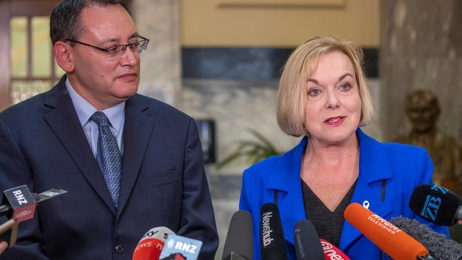
Labour is promising voters it will double workers' sick leave entitlements from five to 10 days a year.
If re-elected it is committing to making the change within its first 100 days and would work with businesses and unions on timeframes.
Labour's workplace relations spokesperson Andrew Little unveiled their policy this morning which also promises to:
• Increase the minimum wage beyond the scheduled increase to $20 next year.
• Raise the age for workers to be allowed to perform hazardous work from 15 to 16-year-old.
• Legislate protections for dependent contractors.
• Strengthen the Employment Relations Act to make it harder for collective agreements to be undermined.
• Legislate for and implementing Fair Pay Agreements.
• Improve transparency for pay across genders and ethnicity.
If re-elected it would legislate to increase the statutory minimum sick leave for workers from five to 10 days.
"To maintain healthy workplaces and to prevent the spread of COVID-19, all workers must be able to take sick leave while self-isolating," Little said.
"The costs to the economy of going into lockdown far outweigh the costs of employees staying home sick."
On increasing minimum wage, Labour said it would take a "balanced approach" so the country's lowest paid workers could benefit from economic growth "while also ensuring employers and businesses can continue to grow and provide stable employment".
It also promised to make it easier for women to gain pay equity in their organisation or across their industry.
There wasn't much detail in their policy document about how it would do that besides "ensuring there are better records of pay equity" across New Zealand.
"This will enable people can better see where the problem lies and build on the work we have already done to streamline the process for women to negotiate equal pay settlements."
It would also introduce Fair Pay Agreements in line with the recommendations of the Fair Pay Agreement Working Group it says would make it easier for workers to receive fair wages and conditions.
Key provisions of Fair Pay Agreements that Labour would introduce include:
• Agreements would cover both employees and dependent contractors.
• Workers would be represented by registered unions during bargaining and only unions would be able to initiate bargaining for the first agreement.
• Concluding an agreement would need over 50 per cent support from workers and over 50% support from employers.
• Once agreed Fair Pay Agreements would cover all employers in the sector but there would be able to be negotiated regional variations and exemptions of up to 12 months for employers facing severe financial hardship.
Labour also committed to simplifying the Holidays Act which it says has failed to provide consistent leave entitlements or provide adequate leave for new workers. It would:
• Introduce legislation to simplify employers' leave calculations.
• Allow employees to take sick and annual leave when needed with their leave accruing over time instead of becoming available as a block when they reach 6 and 12 months employment.
• Allow employees to take bereavement and family violence leave as needed.
And it would strengthen section 59b of the Employment Relations Act so unions don't have to establish the "intent" of employers who automatically pass on gains from collective bargaining to non-union workers.
And lastly it committed to protecting vulnerable workers by:
• legislate protections for dependent contractors
• recognise security guards as vulnerable workers to ensure their terms and conditions are protected
• raise the age for workers to be allowed to perform hazardous work to 16-years old, and ensure all workers have the right to elect health and safety representatives
• ensure that Seafarer Welfare Centres provide better services
Expand Sick Leave from Five Days to Ten Days a Year
Q. Why are you expanding the minimum sick leave entitlement?
A: Managing COVID-19 has shown, more than ever, how important it is for workers to be able to stay
home if they are sick. The current legal minimum of five days of sick leave too often deters people from
staying home when they're sick and can mean that they cannot financially afford to take sick leave. This
is particularly true for parents and caregivers who may need to use their sick leave for family
commitments as well as lower paid workers who can feel pressured into going to work when they
shouldn't. It is estimated around 35% of people typically come into work despite being sick.
Q: Is this a temporary change to respond to COVID-19?
A: While COVID-19 has reminded us how important it is for workers to stay home if they feel sick, this
policy will be a permanent change. This will allow us to better stop the spread of the flu and other
common illnesses, and ensure our workplaces are healthier and safer.
Q: How will this affect someone who is already getting ten or more sick days a year?
A: If a person's contract already allows for ten or more day sick days a year their contract will not be
affected by this policy. This policy change is about ensuring all workers can benefit from additional sick
leave days.
Q. What will be the effect for businesses?
A: It benefits their workplace by preventing the spread of illnesses and ensuring people can fully recover
faster which lifts productivity. Business New Zealand's 2019 Workplace Wellness Report said "a lift in
absence rates may be an acceptable price to pay for overall happier, healthier and more productive
staff."
Q. How will this benefit parents?
A: Many parents and caregivers often need to use their sick leave to time care for their children. By
increasing parents sick leave parents will no longer have to choose between work and caring for family.
Raising the Minimum wage
Q: How much will Labour lift the minimum wage by?
A: We will lift the minimum wage to $20 in 2021. We will take a balanced approach to potential future
increases and signal them well in advance.
Q: What is minimum wage currently?
A: In our first term Labour has already increased the minimum wage from $15.75 to the current rate of
$18.90 an hour. This is $756 before tax for a 40 hour week.
Q: How many workers are affected by minimum wage increases?
A: 85,400 people are estimated to be on the minimum wage according to the 2019 Minimum Wage
Review.
Q: What is the plan for minimum wage increase after 2021?
A: Beyond 2021, we will continue to have a balanced approach to minimum wage increases, ensuring
our lowest paid workers benefit from economic growth, while also ensuring employers and businesses
can continue to grow and provide stable employment. As we have this term we will signal any further
increases in advance to provide certainty for employers.
Living Wage for Public Sector Contractors
Q: What is the Living Wage?
A: The Living Wage is currently $22.10. This reflects the basic expenses of workers and their families
such as food, transportation, housing and childcare. It is calculated independently each year by the
New Zealand Family Centre Social Policy Unit.
The Living Wage emerged as a response to increased hardship and inequality that was being
experienced by many workers. The Living Wage is an hourly wage that a worker needs in order to pay
for the necessities of life and participate as an active citizen in the community.
Q: Does government currently pay the Living Wage?
A: In 2018 we introduced a wage floor equivalent to the Living Wage for all those directly employed in
the core public service. We have also started progressively rolling this out further, for example to around
400 Ministry of Social Development contracted security guards.
Q: Why is it important for the government to pay a Living Wage?
A: Too many workers do valuable work in our communities but their pay is inadequate. The government
must lead by example when employing our contracting staff. Lifting wages means that workers are able
to better support their families, improving quality of life, health and reducing financial stress. The
increase to Living Wage could mean almost an extra $100 a week for a contracted worker who is
currently on minimum wage. This also benefits employers by leading to reduced employee turnover,
increased productivity and improved worker morale.
Q. When will public service contracted workers be paid Living Wage?
A. As current contracts end, public service agencies will be required to guarantee the payment of a
Living Wage as at the time of tendering as part of their new contracts. We expect this policy to be fully
in place within the next parliamentary term.
Legislate and implement Fair Pay Agreements
Q: What is a Fair Pay Agreement?
A: A Fair Pay Agreement is an agreement where minimum terms and conditions are set for workers
across an industry or occupation by employers and unions in that sector.
Q: How are Fair Pay Agreements different to other employment standards?
A: Fair Pay Agreements differ from other employment standards as they set out the minimum accepted
terms and conditions across the entirety of an industry or occupation and are set at an industry-wide
level rather than at each individual business. In the event the parties cannot conclude a Fair Pay
Agreement, the Employment Relations Authority would have the ability to make a binding determination
Q: Why is Labour legislating for and implementing Fair Pay Agreements?
A: Too many workers across New Zealand haven't received their fair share of the economic growth of
the last thirty years. Many businesses have felt forced into a race to the bottom on wages in order to
compete while good employers who pay a fair wage are left behind. By setting industry-wide
agreements on fair pay and conditions we can encourage businesses to compete on the quality of their
products, customer service and innovation. In doing so, Fair Pay Agreements benefit businesses,
workers, and consumers.
Q: What will this mean for businesses?
A: Employers would be able to negotiate additional individual or collective agreements to set pay and
conditions higher than the minimum in Fair Pay Agreements or to cover areas not included, however
they would not be able to negotiate entitlements lower than those in the Fair Pay Agreements.
Reform the Holidays Act
Q: What does the Holidays Act do?
A: The Holidays Act provides for minimum entitlements to annual holidays, public holidays, sick leave
and bereavement leave, and protect work life balance for workers.
Q: Why does the Holidays Act need changing?
A: In recent years it has become apparent that that there has been wide-spread non-compliance with
the Holidays Act as a result of both the Act itself and poor implementation by payroll systems. This
means that it is often too difficult to calculate leave and there is ambiguity about how much leave
employees are entitled to which has led to employees not receiving their full entitlement.
Q: How does reforming the Holidays Act businesses?
A: Our reforms to the Holidays Act will include introducing legislation to simplify employers' leave
calculations, lowering compliance costs and removing ambiguity of leave entitlements.
Q: How does reforming the Holidays Act impact workers?
A: Our reforms will allow workers to take sick and annual leave when needed with their leave accruing
over time instead of becoming available as a block when they reach six and 12 months employment,
as well as allowing them to take bereavement and family violence as needed.
Q: When will the changes come into effect?
A: We will seek to pass the new legislation next term. We will work with businesses on the
commencement date to ensure payroll systems are able to be updated in time.
Rights for Dependent contractors
Q: How are dependent contractors different to other contractors?
A: Dependent contractors are workers who are effectively workers under the control of an employer but
who do not receive the legal protections that are currently provided to regular employees under the law.
Q: How many dependent contractors are in New Zealand?
A: There are over 140,000 self-employed contractors in New Zealand, representing 5% of the working
population, half of which (71,200) rely on one client or business for the majority of their work. A further
9,000 have little or no control over how their daily work is organised according to the 2018 Survey of
Working Life.
Q: What rights will you extend to dependent contractors?
A: We will work through the details with contractors and employers to ensure that a workable regime is
in place. At a minimum we would want to ensure that the right to collectively bargain is extended and
we would also look at extending statutory minimum entitlements like being able to take sick leave.
Q: How will you determine who a dependent contractor is?
A: There are a number of existing tests that the Courts use to decide who a dependant contractor is. A
new statutory test will incorporate these. This includes looking at things like who assigns work to them,
whether they need permission to take time off, and how they are pai
Take your Radio, Podcasts and Music with you









